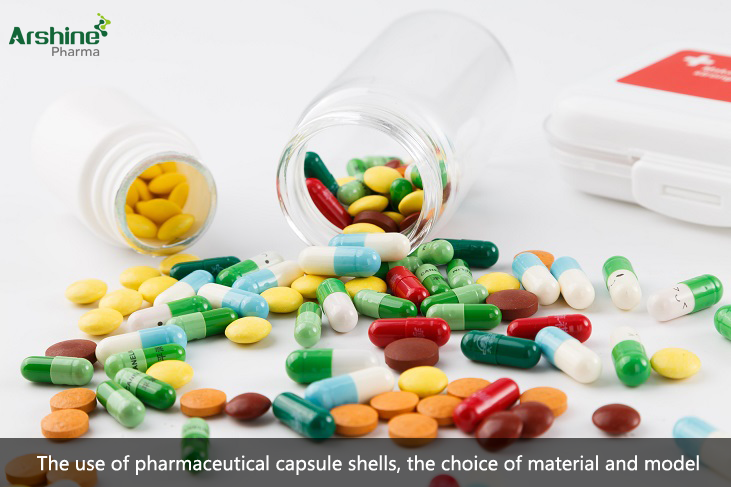
Capsule shells are hollow containers used to encapsulate medications, primarily made from pharmaceutical-grade gelatin or other suitable materials. Their purpose is to protect the medication's stability and efficacy during transportation, storage, and use, while also making it easier for patients to consume.
1. Functions of Capsule Shells
Protection of Medication:
Capsule shells safeguard medications from external environmental factors such as humidity, oxygen, and light, which can cause the drug to degrade, lose potency, or spoil. The sealing capability of capsule shells effectively isolates the medication from these elements, thereby enhancing its stability and shelf life.
Controlled Drug Release:
By selecting different materials and thicknesses for the capsule shells, and by designing specific capsule structures, the release rate and mode of the medication can be controlled. For example, enteric-coated capsules can remain stable in the acidic environment of the stomach and release the drug in the intestines, preventing premature release or degradation in the stomach. This controlled release function enhances the drug's efficacy and reduces side effects.
Ease of Administration:
The hollow design of capsule shells allows for easy filling and encapsulation of drugs. Patients can swallow the medication directly or mix it with a small amount of water before ingestion. Capsule shells are typically tasteless or have a slight taste, which does not affect the taste of the medication, making it easier for patients to take.
Enhanced Bioavailability:
Some drugs may be broken down by stomach acid or digestive enzymes when taken orally, reducing their effectiveness. Capsule shells can protect the drug from these factors, improving its bioavailability. This means the drug can be better absorbed and utilized by the body, thereby enhancing the therapeutic effect.
2. Applications of Capsule Shells
Pharmaceutical Packaging:
Capsule shells are a crucial component of pharmaceutical packaging. They are widely used in packaging various drugs, including capsules, pills, and tablets. The different colors, shapes, and sizes of capsule shells can be selected based on the characteristics and needs of the drug to improve the appearance and identification of the medication.
Customized Drug Formulations:
Certain specialized drug formulations may require capsule shells of specific shapes, sizes, or materials. Capsule shells can be customized according to the requirements of doctors or pharmacists to meet particular therapeutic needs. For example, some drugs require enteric-coated capsules to avoid release in the stomach, or extended-release capsules to prolong the drug's action.
Nutraceuticals and Functional Foods:
In addition to pharmaceuticals, capsule shells are also used in the packaging of nutraceuticals and functional foods. They protect active ingredients from external environmental factors, maintaining their stability and efficacy. Many people prefer taking nutritional supplements, vitamins, and minerals in capsule form for ease of ingestion and absorption.
Industrial Applications:
Capsule shells also have applications in the industrial sector. For instance, in the food industry, they can be used to encapsulate certain food additives or flavors; in the cosmetics industry, they can be used to encapsulate active ingredients or powder-based cosmetics.
3. Selection and Use of Capsule Shells
Material Selection:
The materials for capsule shells are usually pharmaceutical-grade gelatin or other materials that meet pharmaceutical standards. Gelatin is a protein extracted from animal connective tissues and has good biocompatibility and biodegradability. However, due to the potential disease transmission risks from animal-derived materials, alternative capsule materials like plant-based or synthetic polymer capsules are being developed and researched.
When selecting capsule shells, it is essential to consider the material's quality, safety, and suitability. The chosen capsule shells should comply with relevant pharmaceutical standards and regulations to ensure the drug's quality and safety.
Specifications and Sizes:
Capsule shells come in various specifications and sizes, including different sizes, thicknesses, and colors. The appropriate specifications and sizes should be selected based on the drug's nature, dosage, and patient needs. Smaller capsules are suitable for lower-dose drugs, while larger capsules are for higher-dose medications. Additionally, certain drugs may require specific capsule shell thickness to ensure drug release and stability.
Quality Control:
Quality control of capsule shells is crucial. Manufacturers must adhere strictly to pharmacopoeia standards and quality management systems during production to ensure the stability and reliability of capsule shell quality. Quality control includes the inspection of raw materials, monitoring the production process, and testing and releasing the finished products.
Moreover, when using capsule shells, consider the following points:
- Follow the doctor’s or pharmacist’s recommendations and use the capsules as directed in terms of dosage and administration.
- Store capsule shells in a dry, cool, and well-ventilated place, away from direct sunlight and humidity.
- If you have any allergic reactions or intolerance to a specific capsule shell or drug ingredient, inform your doctor or pharmacist immediately.
- Always read the medication instructions carefully before use to understand the drug's usage and precautions.
4. Trends in Capsule Shell Development
As people become increasingly health-conscious, the demand for capsule shells continues to evolve. Overall, capsule shells play an essential role in pharmaceutical packaging and drug formulation. They not only protect the drug’s stability and efficacy but also make it easier for patients to take. With technological advancements and a greater focus on health, the development of capsule shells will continue to adapt to new demands and challenges. When using capsule shells, patients should follow their doctor’s or pharmacist’s advice to ensure proper and safe medication use. Meanwhile, regulatory authorities and manufacturers should enhance quality control measures for capsule shells to safeguard public medication safety.
